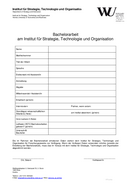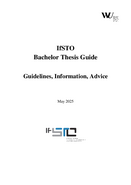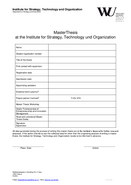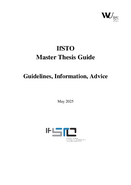Bachelor and Master Thesis at IfSTO
The IfSTO team is happy to supervise your bachelor´s or master´s thesis. You can find current topics for a thesis, information about the process and necessary forms on this page.
If your topic has innovation at the core of the research question, it will constitute a good fit with the institute. The research focus of the institute revolves around Open and User Innovation and we particularly welcome theses in this field. It is, however, not a must. Specifically, we are interested in the following topics:
The Role of Influencers for the Diffusion of Innovation
The Role of AI for Innovation
New Organizational Forms for Innovation
Behavioral and Technique Innovation
Below you will find a list of current topics (topics marked with a Bachelor are for bachelor theses, with an Master for master theses only and Bachelor / Master for both bachelor and master theses). Besides these topics, feel free to come up with your on suggestions! If you have alternative topics with innovations at their core or other topics that relate to our research interests, feel free to contact at us.
Currently offered bachelor's and master's theses:
Call for Master Theses at IfSTO (March 2025)
Call for Master Theses at IfSTO (March 2025)
Dear students,
The Institute for Strategy, Technology and Organization is currently looking for students who want to write their bachelor or master thesis at our institute with a focus on innovation. Your thesis may relate to how individuals or organizations create and capture value through innovation in the digital age. Research areas can include, but are not limited to the following three interrelated areas:
The paradigm shift towards open, user-centered and democratized innovation processes.
The role of digital technologies such as artificial intelligence and/or machine learning for innovation processes: what role may such digital technologies play independently or in collaboration with human intelligence in different phases of the innovation process such as need recognition, ideation, evaluation & testing, development, and diffusion.
New forms of organizing innovation allowing organizations to rapidly adapt in highly dynamic and uncertain environments.
If you are interested in one of these areas please shortly draft on 2-3 pages an outline/essay along the lines given here and send this per email to Christopher.Lettl(at)wu.ac.at
[Master] The Gender Data Gap in Managerial Science
The Gender Data Gap refers to circumstances where the majority of data on which organisational decisions are based are biased in favor of men. That is, data are often incomplete and unreliable because of the absence of information about women’s preferences, fit, etc. (e.g., devices designed to optimally fit male handspans, personal protective equipment designed for male bodies, and organisational practices such as informal networking over drinks in the evening, when women and caregivers are not present). Understanding Gender Data Gap effects is important for designing effective interventions to achieve gender equality all the way up the organisational ladder. To address this research gap, we are interested in Bachelor Theses which enlarge our current understanding of the Gender Data Gap’s (negative) impact on women as well as on organizations altogether. Possible questions, which can be focused on, are (but are not limited to):
How can our management and organization theories be extended and strengthened by making ‘invisible acts’ (e.g., instrumental work activities done by women that are neither recognized nor rewarded) more visible?
What assumptions in management and organisation studies must be revisited based on novel insights derived from efforts to close the Gender Data Gap?
If you are interested in this topic, please send a short draft (max. 1 page) of your proposed topic along with the formulation of a specific research question and an outline for the thesis to Dr. Sonja Sperber (sonja.sperber@wu.ac.at).
If you are interested in the topic, please contact:
[Master] The Impact of Precarity on the Gender Gap in Management
Still today, women are significantly underrepresented in top executive positions. While progress towards a higher female rate has been made within the last years, the gender gap on top organizational level is still to be solved. Past studies have identified several factors which account for the gender gap, among them differences in network structures and access to knowledge and social resources, as they tend to disadvantage women in their career path. Even though precarious employment (e.g., part-time work, fixed-term contracts) has previously been acknowledged for its (negative) impact on female workers, its consequences have mostly been disregarded when examining the underrepresentation of women in top organizational positions. The aim of a Master Thesis in this field is to explore this topic further with a qualitative (interview study) or quantitative research study, for instance with regard to the factors causing the negative impact for women, future approaches which help to reduce the negative effects etc.
If you are interested in this topic, please send a short draft (max. 1 page) of your proposed topic along with the formulation of a specific research question and an outline for the thesis to Dr. Sonja Sperber (sonja.sperber@wu.ac.at).
[Master] How can Digital Technologies Support Sustainable Business Models?
Digital sustainable entrepreneurship, so the embeddedness of digital technologies in sustainable business models of newly founded companies, has been in the centre of researchers’ interest for some time. While so far the focus has mainly been on the blended value propositions, the extensive opportunities which digital technologies offer for new sustainable business models has not been investigated in detail.
We therefore seek master theses which look into how existing sustainable business models can implement digital technologies. The focus of the master thesis could either be on the asset which existing companies could gain from applying certain new technologies, or on the difficulties and threats associated with their application (for instance, regarding tensions between financial value of sustainable products and the costs of value creation). Are there specific (internal or external) preconditions for a company’s successful implementation of digital technologies? What hinders, what supports their application? Which roles do the customers play in the (successful) implementation of such “digital sustainable business model innovations”?
If you are interested in this topic and would like to discuss it further, please get in contact with Dr. Sonja Sperber (sonja.sperber@wu.ac.at).
If you are interested in this topic and would like to discuss it further, please get in contact with
[Master] The External Perception of Entrepreneurial Success
An ongoing discussion on gender-based factors in entrepreneurship has provided profound insights on several conditions which differ between women and men when starting a business, among them the distinct availability of resources and a discrepancy in the support provided by the founder’s ecosystem. However, once anticipating a successful foundation of the start-up, little is known on how/if the external perception of the venture with its associated success factors differs depending on who the founder is (see further the AMJ article by Kanze, Huang, Conley and Higgins, 2018: “We ask men to win and women not to lose: Closing the Gender Gap in startup funding”). We hence are interested in Master Theses which investigate the external perception of success, for instance through the analysis of newspaper data on startup success. How does the perception of female and male success differ? What is the different perception based on (e.g., personal characteristics, educational background, etc.)?
If you are interested in this topic, please send a short draft (max. 1 page) of your proposed topic along with the formulation of a specific research question and an outline for the thesis to Dr. Sonja Sperber (sonja.sperber@wu.ac.at).
If you are interested in this topic, please send a short draft (max. 1 page) of your proposed topic along with the formulation of a specific research question and an outline for the thesis to:
[Master] Creative dynamics in the music industry
Background
Creativity and innovation go hand in hand. Understanding the dynamics of highly creative industries such as the music sector, can help the understanding of innovation dynamics in less creative fields as well.
Even though the abundance of data resulting from the digitalization of the music industry, offers a great opportunity to study these creative dynamics and to answer innovation and creativity related research questions, identifying, fetching, and analyzing the right data is not a trivial task.
Projects in this field will be decidedly quantitative and oriented to the identification and combination of data sources that will be subsequently explored and analyzed to answer innovation and creativity related questions regarding:
Spatial analysis of music-similarity
Identification of causal effects from industry/policy shocks on artists and labels
Nature and relevance of creativity on performance outcomes (e.g. analysis of antecedents and consequents of remixing music)
By working on this topic, you will:
Have the chance to engage in an “applied” M.Sc. dissertation project in which you can develop and showcase your data science skills.
Be providing a very valuable contribution to (hopefully) future published studies by IfSTO researchers.
Goal
Familiarizing with:
Associating a research question on creativity and innovation to data analysis
Data collection via data dumps, APIs, and web scraping
Data cleaning
Data analysis
Potential methods
Exclusively quantitative, most likely involving the collection of your own data via web-scraping, API or public data-dump queries.
Please note that, due to their data intensive nature, projects in this field require a certain familiarity with programming languages (i.e. Python or R) before initiating the project. While the topic lends itself well to expanding one’s programming and analysis competences (e.g. accessing new data sources, scraping an unfamiliar website, applying a new analysis technique – e.g. panel-data regression, spatial econometrics, ML-classification), it is not suitable for novices (i.e. no prior experience outside of online-courses or introductory workshops)
If you are interested or need further information, please contact Alessio Delpero
(alessio.delpero@wu.ac.at)
If you are interested, please contact:
[Bachelor] Organizational Idea Generation – Why Do (Good) Innovative Ideas Fail?
Reasons for the failure of innovative ideas before they enter the market have been discussed for a long time, ranging from internal lack of support within the organization, a lack of funding, to missing commitment from the firms’ decision makers etc. Besides these issues, one of the crucial obstacles during the organizational idea generation process is the missing identification of the real value of ideas, meaning the clear identification of the problem statement and the solution that is offered with the innovative idea.
Companies often struggle to identify this real value of new ideas early on. We hence seek bachelor theses which address and analyse reasons for failure that are caused by the missing identification of value, and develop ideas for organizational mechanisms that can alleviate these effects. Preferably, this will either be accomplished with a case study approach or with an in-depth qualitative analysis.
If you are interested in this topic and would like to discuss it further, please get in contact with Dr. Sonja Sperber (sonja.sperber@wu.ac.at).
If you are interested, please contact:
[Bachelor] The Gender Data Gap in Managerial Science
Lately, Artificial Intelligence has shown its high possible impact on businesses, including the increase of productivity and of improving operational efficiencies. However, one central factor which influences the success of AI applications are persistent data gaps.
One of the largest data gaps, the Gender Data Gap, refers to circumstances where the majority of data on which organisational decisions are based are biased in favor of men. That is, data are often incomplete and unreliable because of the absence of information about women’s preferences, fit, etc. With this topic for potential bachelor theses, we are seeking examinations of how AI will help to close (or potentially even severe) the persistent data gap, and how this will eventually impact the businesses and their productivity.
If you are interested in this topic, please send a short draft (max. 1 page) of your proposed topic along with the formulation of a specific research question and an outline for the thesis to Dr. Sonja Sperber (sonja.sperber@wu.ac.at).
If you are interested, please contact:
[Bachelor] Knowledge Transfer for Innovations via Network Ties: How Do Managerial Levels Differ?
Previous studies have started to investigate the most relevant knowledge ties of managers within their networks. Especially when considering the vital role of innovations for organizations, the understanding of where the most important knowledge for innovation endeavors originates from is of high importance. While some studies have found out that predominantly the cross-hierarchical network ties can have a special impact on the generation of organizational innovations, we still aim to find out more about – among others – the specific type of knowledge transmitted between network partners as well as potential differences between managerial levels (e.g., top level vs. low level).
If you are interested in this topic and would like to discuss it further, please get in contact with Dr. Sonja Sperber (sonja.sperber@wu.ac.at).
If you are interested, please contact:
[Bachelor/Master] The Gender Data Gap: How Will Artificial Intelligence Impact Missing Data?
Lately, Artificial Intelligence has shown its high possible impact on businesses, including the increase of productivity and of improving operational efficiencies. However, one central factor which influences the success of AI applications are persistent data gaps.
One of the largest data gaps, the Gender Data Gap, refers to circumstances where the majority of data on which organisational decisions are based are biased in favor of men. That is, data are often incomplete and unreliable because of the absence of information about women’s preferences, fit, etc. With this topic for potential bachelor theses, we are seeking examinations of how AI will help to close (or potentially even severe) the persistent data gap, and how this will eventually impact the businesses and their productivity.
If you are interested in this topic, please send a short draft (max. 1 page) of your proposed topic along with the formulation of a specific research question and an outline for the thesis to Dr. Sonja Sperber (sonja.sperber@wu.ac.at).
If you are interested in this topic and would like to discuss it further, please get in contact with:
[Bachelor/Master] The Art of Luxury Innovation
Luxury companies are often associated with heritage, consistency and tradition. However, customers’ call for innovation increasingly also affects those tradition-driven firms. Therefore, a form of innovation that both adheres to those long-standing values of quality as well as the ongoing orientation towards change and newness arises. This bachelor thesis topic can either focus on product- or service-oriented luxury firms and investigates the art of luxury innovation in a qualitative study.
If you are interested in this topic, please send a short draft (max. 1 page) of your proposed topic along with the formulation of a specific research question and an outline for the thesis to Dr. Sonja Sperber (sonja.sperber@wu.ac.at).
If you are interested in this topic, please send a short draft (max. 1 page) of your proposed topic along with the formulation of a specific research question and an outline for the thesis to:
[Bachelor/Master] Mapping Makerspaces: characteristics, participants, and innovative potential
Makerspaces are collaborative environments that provide access to tools, technology, and a community of like-minded individuals interested in hands-on creation. They play a crucial role in fostering innovation, knowledge sharing, and entrepreneurial activities. However, despite their increasing presence in the DACH region, little systematic research exists on their characteristics, the types of participants they attract, and their broader impact on innovation and collaboration.
Many open questions remain in this field, and bachelor or master theses could explore topics such as:
What are the key characteristics that differentiate various types of makerspaces in the DACH region?
Who are the typical participants of makerspaces, and what motivates them to engage?
How do makerspaces foster collaboration and knowledge exchange among their members?
What impact do makerspaces have on individual learning, skill development, and entrepreneurial activities?
How can survey and interview data be used to generate a typology of makerspaces?
To address these questions, the research will be based on two complementary approaches:
Survey Study: A structured, quantitative approach to systematically assess the characteristics of makerspaces, their facilities, governance models, and the demographics of their participants.
Interviews with Makerspace Owners and Participants: A qualitative study to explore motivations, collaboration dynamics, and the perceived benefits and challenges of makerspaces.
Depending on the specific research question and methodological preferences, thesis projects could take different forms, including:
Literature reviews: Synthesizing existing research on makerspaces, their role in innovation, and their impact on participants.
Survey-based research: Designing, conducting, and analyzing a survey on makerspace characteristics and participants.
Qualitative interviews/case studies: Conducting in-depth interviews with makerspace owners and participants to explore motivations and collaboration patterns.
Mixed-method approaches: Combining surveys and interviews for a more comprehensive analysis.
If you are interested and would like more information, please contact Florian Nemetz (florian.peter.nemetz@wu.ac.at). If you already have a concrete idea, feel free to send a short draft (max. 2 pages) outlining your research question and methodological approach.
If you are interested, please contact:
Florian Nemetz, M.Sc. M.SSc.
Research and Teaching Assistant (prae doc)
Curiculum-Vitae
Florian Nemetz has been teaching and conducting research at the Institute for Strategy, Technology, and Organization as a pre-doctoral university assistant since 2023. Mr. Nemetz completed his bachelor's and master's degrees in psychology and sociology at the University of Salzburg.
Before joining as a university assistant, Mr. Nemetz gained work experience as a research assistant in the fields of global inequalities in sociology and migration sociology. Furthermore, Mr. Nemetz was involved in psychological test development, psychological diagnostics, and served as a data manager in psychotherapy research. Additionally, Mr. Nemetz participated in research projects related to topics such as aging and digitalization, as well as migration sociology.
[Bachelor] What makes social movements successful, and what does that mean?
Social movements (SMs) can be regarded as an attempt to solve social problems as perceived by (parts of) civil society. Suggested solutions to these problems often break with the status quo, challenging presumptions about what is important and how certain things are done in different parts of society. If SMs are successful in achieving their goals on a long-term basis, new practices, processes, organizational forms, and societal structures can emerge. Therefore, the question of what leads SMs to long-lasting success is of crucial importance to all parts of society, including business, social care, education and many more.
However, there are many open questions about what factors lead SMs to long-lasting success in the form of permanent societal impact. While a lot of studies have focused on case studies and comparative analyses of (un)successful SMs, an overall framework of what leads some SMs to achieve lasting success is still lacking. A large part of that challenge stems from the variety of different SMs and varying definitions and degrees of success. Potential bachelor theses regarding what makes SMs successful could tackle the following research questions (and many more):
What constitutes a “successful” SM?
How could the success of SMs be measured and evaluated with actual data?
What factors differentiate SMs that fail in their goals, SMs that achieve long-term goals, and SMs that have a long-term impact on society?
How could the abundance of case studies and comparative analyses on social movements be summarized and integrated into an overarching framework?
…
These questions could be tackled via literature reviews, theoretical and conceptual work and/or secondary data analyses. Depending on the concrete question, other methods might yield new, innovative results, leaving room for conceptional (and creative) freedom in approaching those questions.
If you are interested and need more information, please contact Florian Nemetz (florian.peter.nemetz@wu.ac.at). If you have a very concrete idea already, feel free to send along a short draft (max. 2 pages) of the research question and how the question could be approached methodically.
The further process
The further process
For your support, we have prepared further information on the process and helpful information in the bachelor thesis or master thesis guide. Here, you will also be able to find the registration forms required for the official registration of your thesis.
If you are interested in writing a thesis at our institute, please feel free to contact the potential thesis supervisor from the subject area you are interested in. The best way is to write an email describing your interest in a particular topic or the topic/issue you would like to explore.
Bachelor Thesis (current version, May 2025)
Master Thesis (current version, May 2025)
Institute for Strategy, Technology and Organization




